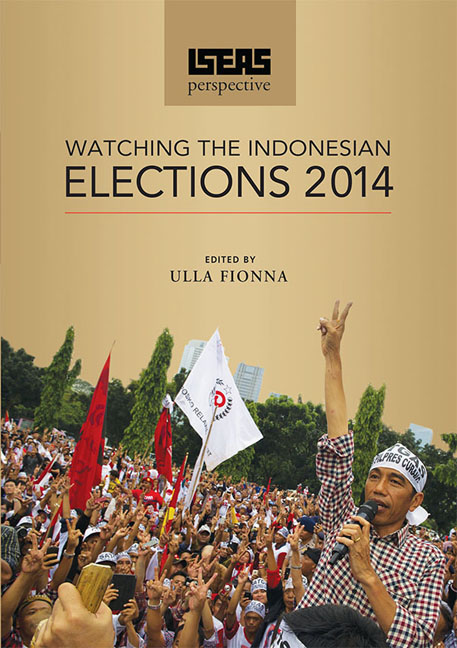Book contents
- Frontmatter
- Contents
- Foreword
- Introduction
- 1 The Gubernatorial Race in Jakarta: Background and Implications
- 2 Indonesian Parties Struggle for Electability
- 3 Who Will Be Indonesian President in 2014?
- 4 Indonesian Presidential Election Forcing Rejuvenation of Parties
- 5 Resisting Democracy: Front Pembela Islam and Indonesia's 2014 Elections
- 6 Getting to Know the Contestants of the 2014 Indonesian Parliamentary Elections
- 7 A Snapshot of the Campaigning in Indonesia's 2014 Legislative Elections
- 8 Unpacking the Results of the 2014 Indonesian Legislative Elections
- 9 Indonesia's 2014 Legislative Elections: The Dilemmas of “Elektabilitas” Politics
- 10 The Islamic Factor in the 2014 Indonesian Elections
- 11 Vote-buying in Indonesia's 2014 Elections: The Other Side of the Coin
- 12 Gap Narrows Between Candidates in Indonesian Presidential Elections
- 13 Analysing the Economic Platforms in the Indonesian Presidential Election
- 14 Indonesian Islamic Parties After the 2014 Elections: Divided and Self-Centred
- 15 Safeguarding Indonesia's Pluralism: An Essential Task for Joko Widodo
- 16 Jokowi's Key Economic Challenge: Improving Fiscal Policy for Equitable Growth
- 17 Crossing the River While Avoiding the Stones: Jokowi's Run-up to the Presidency
- 18 Post-elections Indonesia: Towards a Crisis of Government?
- Epilogue: Jokowi's First Months: Compromise Cabinet, Subsidy Cuts, and Corrupt Coalition
6 - Getting to Know the Contestants of the 2014 Indonesian Parliamentary Elections
Published online by Cambridge University Press: 29 July 2017
- Frontmatter
- Contents
- Foreword
- Introduction
- 1 The Gubernatorial Race in Jakarta: Background and Implications
- 2 Indonesian Parties Struggle for Electability
- 3 Who Will Be Indonesian President in 2014?
- 4 Indonesian Presidential Election Forcing Rejuvenation of Parties
- 5 Resisting Democracy: Front Pembela Islam and Indonesia's 2014 Elections
- 6 Getting to Know the Contestants of the 2014 Indonesian Parliamentary Elections
- 7 A Snapshot of the Campaigning in Indonesia's 2014 Legislative Elections
- 8 Unpacking the Results of the 2014 Indonesian Legislative Elections
- 9 Indonesia's 2014 Legislative Elections: The Dilemmas of “Elektabilitas” Politics
- 10 The Islamic Factor in the 2014 Indonesian Elections
- 11 Vote-buying in Indonesia's 2014 Elections: The Other Side of the Coin
- 12 Gap Narrows Between Candidates in Indonesian Presidential Elections
- 13 Analysing the Economic Platforms in the Indonesian Presidential Election
- 14 Indonesian Islamic Parties After the 2014 Elections: Divided and Self-Centred
- 15 Safeguarding Indonesia's Pluralism: An Essential Task for Joko Widodo
- 16 Jokowi's Key Economic Challenge: Improving Fiscal Policy for Equitable Growth
- 17 Crossing the River While Avoiding the Stones: Jokowi's Run-up to the Presidency
- 18 Post-elections Indonesia: Towards a Crisis of Government?
- Epilogue: Jokowi's First Months: Compromise Cabinet, Subsidy Cuts, and Corrupt Coalition
Summary
INTRODUCTION
The upcoming 2014 parliamentary and presidential elections will be the most important yet for Indonesia. Voters will go to the polls to pick their parliamentarians on 9 April, and parties will be vying for support from an increasingly sceptical electorate.
Three elections after major political reforms were carried out, there are strong demands that the democratic transition should continue. The process seems to have stalled with corruption remaining rampant, the legal system still weak and corrupt, and the parliament approving bills that compromise reform objectives. These, along with overall dissatisfaction towards President Susilo Bambang Yudhoyono's (SBY) performance, have fuelled the demand and even urgency, for change in the political leadership.
The parties still remain the gateway to political office at the central and local levels, and party politicians elected into public office are often responsible for managing state or local budgets. Many of these officials are now either jailed, facing trials, or under investigation for corruption allegations. Meanwhile, they are broadly criticized for being inefficient and unproductive. Aside from all these, parties are generally poorly institutionalized — as clearly evidenced by the lack of clear platforms, and by the heavy reliance on particular figures and leaders for support and popularity.
As a result, the upcoming elections will be about which party has the most popular candidates. Parties have therefore been scrambling to identify those who can attract voters. This is made all the more necessary by the fact that specific platforms and party programmes are largely missing. The 2014 election is shaping up to be a race based on image and popularity. Increasingly, it is about those picked by parties to represent them.
THE PARTIES
Partai Nasional Demokrat (Partai Nasdem, National Democratic Party)
Born as a mass organization, it declared itself a party on 26 July 2011. It lists Pancasila as its ideology, and it is the newest party that will be competing. This election is also its first. It was founded and chaired by Surya Paloh, an ambitious former Golkar official who owns Metro TV, the number one Indonesian television news network.
- Type
- Chapter
- Information
- ISEAS PerspectiveWatching the Indonesian Elections 2014, pp. 41 - 53Publisher: ISEAS–Yusof Ishak InstitutePrint publication year: 2015



